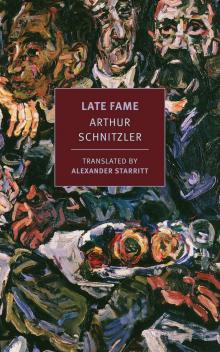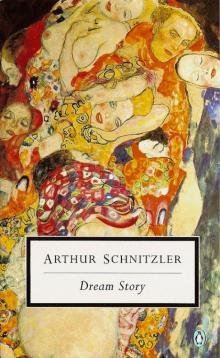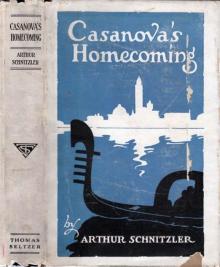- Home
- Arthur Schnitzler
Casanova's Homecoming Page 9
Casanova's Homecoming Read online
Page 9
CHAPTER NINE.
Returning to the house, Casanova disposed of his gold in a safe cornerof the turret chamber. Thence he descended to the garden, where aspectacle awaited him, not in itself remarkable, but one which touchedhim strangely in his present mood. Upon a bench at the edge of thegreensward Olivo was sitting beside Amalia, his arm round her waist.Reclining at their feet were the three girls, tired out by theafternoon's play. Maria, the youngest, had her head in her mother's lap,and seemed to be asleep; Nanetta lay at full length on the grass withher head pillowed on her arm; Teresina was leaning against her father'sknee, and he was stroking her hair. As Casanova drew near, Teresinagreeted him, not with the look of lascivious understanding which he hadinvoluntarily expected, but with a frank smile of childlike confidence,as if what had passed between them only a few hours before had beennothing more than some trivial pastime. Olivo's face lighted up infriendly fashion, and Amalia nodded a cordial greeting. It was plain toCasanova that they were receiving him as one who had just performed agenerous deed, but who would prefer, from a sense of refinement, that noallusion should be made to the matter.
"Are you really determined to leave us tomorrow, Chevalier?" enquiredOlivo.
"Not to-morrow," answered Casanova, "but, as I told you, this veryevening."
Olivo would fain have renewed his protests, but Casanova shrugged,saying in a tone of regret: "Unfortunately, my letter from Venice leavesme no option. The summons sent to me is so honorable in every respectthat to delay my return home would be an unpardonable affront to mydistinguished patrons." He asked his host and hostess to excuse him fora brief space. He would go to his room, make all ready for departure,and would then be able to enjoy the last hours of his stay undisturbedin his dear friends' company.
Disregarding further entreaties, he went to the turret chamber, andfirst of all changed his attire, since the simpler suit must sufficefor the journey. He then packed his valise, and listened for Lorenzi'sfootsteps with an interest which grew keener from moment to moment.Before the time was up, Lorenzi, knocking once at the door, entered,wearing a dark blue riding-cloak. Without a word, he slipped the cloakfrom his shoulders and let it fall to the floor, where it lay betweenthe two men, a shapeless mass of cloth. Casanova withdrew his kerchieffilled with the gold pieces from beneath the bolster, and emptied themoney on the table. He counted the coins under Lorenzi's eyes--a processwhich was soon over, for many of the gold pieces were worth severalducats each. Putting the stipulated sum into two purses, he handedthese to Lorenzi. This left about a hundred ducats for himself. Lorenzistuffed the purses into his tail-pockets, and was about to leave, stillsilent.
"Wait a moment, Lorenzi," said Casanova. "Our paths in life may crossonce again. If so let us meet as friends. We have made a bargain likemany another bargain; let us cry quits."
Casanova held out his hand. Lorenzi would not take it. He spoke for thefirst time. "I cannot recall that anything was said about this in ouragreement." Turning on his heel he left the room. "Do we stand sostrictly upon the letter, my friend?" thought Casanova. "It behooves meall the more to see to it that I am not duped in the end." In truth, hehad given no serious thought to this possibility. He knew from personalexperience that such men as Lorenzi have their own peculiar code ofhonor, a code which cannot be written in formal propositions, but whichthey can be relied upon to observe.
He packed Lorenzi's cloak in the top of the valise. Having stowed awayupon his person the remaining gold pieces, he took a final glance roundthe room which he was never likely to revisit. Then with sword and hat,ready for the journey, he made his way to the hall, where he foundOlivo, Amalia, and the children already seated at table. At the sameinstant, Marcolina entered by the garden door. The coincidence wasinterpreted by Casanova as a propitious sign. She answered hissalutation with a frank inclination of the head.
Supper was now served. The conversation dragged a little at first, as ifall were oppressed by the thought of the imminent leave-taking. Amaliaseemed busied with her girls, concerned to see that they were not helpedto too much or too little. Olivo, somewhat irrelevantly, began to speakof a trifling lawsuit he had just won against a neighboring landowner.Next he referred to a business journey to Mantua and Cremona, which hewould shortly have to undertake. Casanova expressed the hope that erelong he would be able to entertain his friend in Venice, a city which,by a strange chance, Olivo had never visited. Amalia had seen the placeof wonder as a child. She could not recall the journey thither, butcould only remember having seen an old man wrapped in a scarlet cloak,disembarking from a long black boat. He had stumbled and had fallenprone.
"Have you never been to Venice either?" asked Casanova of Marcolina, whowas seated facing him, so that she could see over his shoulder into thedeep gloom of the garden. She shook her head. Casanova mused: "If Icould but show you the city in which I passed my youth! Had you but beenyoung with me!" Another thought, as foolish as both of these, crossedhis mind: "Even now, if I could but take you there with me."
While thus thinking, at the same time, with the ease of manner peculiarto him in moments of great excitement, he began to speak of his nativecity. At first his language was cool; he used an artist's touch, as ifpainting a picture. Warming up by degrees, he entered into details ofpersonal history, so that of a sudden his own figure appeared in thecentre of the canvas, filling it with life. He spoke of his mother,the celebrated actress, for whom her admirer Goldoni had written hisadmirable comedy, _La Pupilla_. Next he recounted the unhappy days spentin Dr. Gozzi's boarding school. Then he spoke of his childish passionfor the gardener's little daughter, who had subsequently run away with alackey; of his first sermon as a young abbate, after which he found inthe offertory bag, in addition to the usual collection, a number of loveletters; of his doings as a fiddler in the orchestra of the San SamueliTheatre; of the pranks which he and his companions had played in thealleys, taverns, dancing halls, and gaming-houses of Venice--sometimesmasked and sometimes unmasked. In telling the story of these riotousescapades, he was careful to avoid the use of any offensive epithet. Hephrased his narrative in choice imaginative language, as if paying dueregard to the presence of the young girls, who, like their elders,including Marcolina, listened with rapt attention. The hour grew late,and Amalia sent her daughters to bed. They all kissed Casanova a tendergood-night, Teresina behaving exactly like her sisters. He made thempromise that they would soon come with their father and mother to visithim in Venice. When they had gone, he spoke with less restraint, butcontinued to avoid any unsuitable innuendo or display of vanity. Hisaudience might have imagined themselves listening to the story of aParsifal rather than to that of a Casanova, the dangerous seducer andhalf-savage adventurer.
He told them of the fair Unknown who had travelled with him for weeksdisguised as a man in officer's uniform, and one morning had suddenlydisappeared from his side; of the daughter of the gentleman cobbler inMadrid who, in the intervals between their embraces, had studiouslyendeavored to make a good Catholic of him; of Lia, the lovely Jewess ofTurin, who had a better seat on horseback than any princess; of ManonBalletti, sweet and innocent, the only woman he had almost married; ofthe singer whom he had hissed in Warsaw because of her bad performance,whereupon he had had to fight a duel with her lover, General Branitzky,and had been compelled to flee the city; of the wicked woman Charpillon,who had made such an abject fool of him in London; of the night when hecrossed the lagoons to Murano on the way to his adored nun, the nightwhen he nearly lost his life in a storm; of Croce the gamester, who,after losing a fortune at Spa, had taken a tearful farewell of Casanovaupon the high-road, and had set off on his way to St. Petersburg, justas he was, wearing silk stockings and a coat of apple-green satin, andcarrying nothing but a walking cane.
He told of actresses, singers, dressmakers, countesses, dancers,chambermaids; of gamblers, officers, princes, envoys, financiers,musicians, and adventurers. So carried away was he by the rediscoveredcharm of his own past, so completely did the triumph of these splendid
though irrecoverable experiences eclipse the consciousness of theshadows that encompassed his present, that he was on the point oftelling the story of a pale but pretty girl who in a twilit church atMantua had confided her love troubles to him--absolutely forgetting thatthis same girl, sixteen years older, now sat at the table before himas the wife of his friend Olivo--when the maid came in to say that thecarriage was waiting. Instantly, with his incomparable talent for doingthe right thing, Casanova rose to bid adieu. He again pressed Olivo, whowas too much affected to speak, to bring wife and children to visit himin Venice. Having embraced his friend, he approached Amalia withintent to embrace her also, but she held out her hand and he kissed itaffectionately.
When he turned to Marcolina, she said: "You ought to write downeverything you told us this evening, Chevalier, and a great deal more,just as you have penned the story of your flight from The Leads."
"Do you really mean that, Marcolina?" he enquired, with the shyness of ayoung author.
She smiled with gentle mockery, saying: "I fancy such a book might provefar more entertaining than your polemic against Voltaire."
"Very likely," he thought. "Perhaps I may follow your advice some day.If so, you, Marcolina, shall be the theme of the last chapter."
This notion, and still more the thought that the last chapter was to belived through that very night, made his face light up so strangely thatMarcolina, who had given him her hand in farewell, drew it awayagain before he could stoop to kiss it. Without betraying eitherdisappointment or anger, Casanova turned to depart, after signifying,with one of those simple gestures of which he was a master, his desirethat no one, not even Olivo, should follow him.
He strode rapidly through the chestnut avenue, handed a gold piece tothe maid who had brought his valise to the carriage, took his seat anddrove away.
The sky was overcast. In the village, lamps were still burning in someof the cottages; but by the time the carriage regained the open road,the only light piercing the darkness was supplied by the yellow rays ofthe lantern dangling from the shaft. Casanova opened the valise, tookout Lorenzi's cloak, flung it over his shoulders, and under this coverrapidly undressed. He packed the discarded clothing, together with shoesand stockings, in the valise, and wrapped himself in the cloak. Then hecalled to the coachman:
"Stop, we must drive back!"
The coachman turned heavily hi his seat.
"I have left some of my papers in the house. Don't you understand? Wemust drive back."
When the coachman, a surly, thin greybeard, still hesitated, Casanovasaid: "Of course I will pay you extra for your trouble. Here you are!"He pressed a gold piece into the man's hand.
The coachman nodded, muttered something, gave his horse a needless cutwith the whip, and turned the carriage round. When they drove backthrough the village, all the houses were dark. A little farther on, thecoachman was about to turn into the by-road leading up the gentle ascentto Olivo's house.
"Halt!" cried Casanova. "We won't drive any nearer, lest we should wakethem all up. Wait for me here at the corner. I shall be back in a minuteor two. If I should happen to keep you longer, you shall have a ducatfor every hour!"
The man by his nod seemed to show he understood what was afoot.
Casanova descended and made quickly past the closed door and along thewall to the corner. Here began the path leading through the vineyards.It still led along the wall. Having walked it twice by daylight,Casanova had no difficulty in the dark. Half way up the hill came asecond angle in the wall. Here he had again to turn to the right, acrosssoft meadow-land, and in the pitchy night had to feel along the walluntil he found the garden door. At length his fingers recognized thechange from smooth stone to rough wood, and he could easily make out theframework of the narrow door. He unlocked it, entered the garden, andmade all fast again behind him.
Across the greensward he could now discern house and tower. They seemedincredibly far off and yet incredibly large. He stood where he was for awhile, looking around. What to other eyes would have been impenetrabledarkness, was to him no more than deep twilight. The gravel pathbeing painful to his bare feet, he walked upon the greensward, where,moreover, his footfall made no sound. So light was his tread that hefelt as if soaring.
"Has my mood changed," he thought, "since those days when, as a man ofthirty, I sought such adventures? Do I not now, as then, feel all theardors of desire and all the sap of youth course through my veins? Am Inot, as of old, Casanova? Being Casanova, why should I be subject, asothers are subject, to the pitiful law which is called age!"
Growing bolder, he asked himself: "Why am I creeping in disguise toMarcolina? Is not Casanova a better man than Lorenzi, even though he bethirty years older? Is not she the one woman who would have understoodthe incomprehensible? Was it needful to commit this lesser rascality,and to mislead another man into the commission of a greater rascality?Should I not, with a little patience, have reached the same goal?Lorenzi would in any case have gone to-morrow, whilst I should haveremained. Five days, three days, and she would have given herself to me,knowing me to be Casanova."
He stood close to the wall of the house beneath Marcolina's window,which was still closed. His thoughts ran on: "Is it too late? Icould come back to-morrow or the next day. Could begin the work ofseduction--in honorable fashion, so to speak. To-night would be but aforetaste of the future. Marcolina must not learn that I have been hereto-day--or not until much later."

 Dying
Dying Late Fame
Late Fame Dream Story
Dream Story Casanova's Homecoming
Casanova's Homecoming